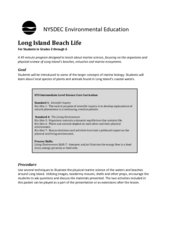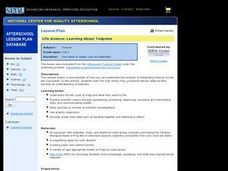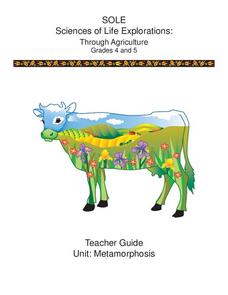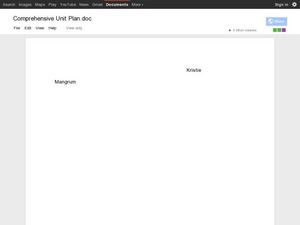Curated OER
Ocean Life
Mini-marine biologists use Scholastic Explorers website to learn about declining numbers of leatherback sea turtles and dusky dolphins. They fill out a K-W-L chart and observation journal worksheet, which are both provided in the lesson...
NOAA
Invertebrates
Crabs and lobsters ... yum! The 18th installment of a 23-part NOAA Enrichment in Marine sciences and Oceanography (NEMO) program focuses on invertebrate marine life. After the lecture slideshow, learners conduct an activity to sample...
NOAA
Ocean Acidification
If tap water is more acidic than ocean water, why are we so concerned about ocean acidification? The third installment of a 23-part NOAA Enrichment in Marine sciences and Oceanography (NEMO) program focuses on carbon dioxide levels in...
National Science Teachers Association
Hop into Action
Young scientists find out what makes amphibians such unique and interesting animals in this simple life science lesson. After looking at pictures and discussing the characteristics of amphibians, learners complete a series of three Venn...
University of Colorado
Is There Life on Earth?
To find life on another planet, scientists look for gases (atmosphere), water, and temperatures that are not extreme. In this activity, groups of pupils become "Titan-ians," scientists who want to explore Earth for possible life forms....
ReadWriteThink
Webcams in the Classroom: Animal Inquiry and Observation
Boost observational skills with an inquiry-based lesson that takes scholars on a virtual field trip. With help from webcams, learners observe animals in a zoo or aquarium. Observations go into a journal and a discussion is held to review...
Curated OER
A Lesson in Biodiversity: Making Comparisons Between Defensive Mechanisms Utilized by Marine Organisms
If your upper elementary or middle school marine biology learners are going to visit an aquarium, then here is a field trip activity guide for you. It is written specifically for The Maritime Aquarium, but the idea can be adapted to any...
Curated OER
Long Island Beach Life
Have your class learn about marine life through this resource. This comprehensive lesson plan has learners discuss marine life, learn key vocabulary, discuss environmental concerns, and play games related to migration and predator/prey...
American Physiological Society
An Inquiry into Alcoholic Fermentation
Introduce life science students to their new "best buds" yeast! Using a wide variety of materials, lab groups design an experiment that illustrates how yeast acquires the resources it needs to undergo cellular respiration. The teacher's...
Curated OER
Coloring the Life Cycle of Fruits and Vegetables
Students investigate how fruits and vegetables change and grow. In this life cycle of fruits and vegetables lesson, students observe the changes in fruits and vegetables as they grow and record the colors on a worksheet.
Curated OER
Life Science- Learning About Tadpoles
Students investigate a frog's life cycle. In this tadpole lesson plan, students observe tadpoles in an aquarium and record results. Students fill in a KWL chart as an assessment.
Curated OER
Marine Biology Field Trips
Students visit a Marine Biology study area 2-3 times and write a report after the last visit. They participate in the Marine Biology field trips working with lab partners. They complete data sheets to write their primitive environmental...
Berkshire Museum
Meet a Naturalist: Researching, Writing, Interviewing
Young scholars reach out into the community and learn about different environmental science careers in this inquiry-based instructional activity. Beginning with a short research assignment, children gain background knowledge about...
Cornell University
Metamorphosis
Looking for an insect unit that addresses multiple skill strategies? Young entomologists explore multiple life cycles of insects that go through metamorphosis. The brainteasers and mobile activity spark learner interest before guiding...
NOAA
Seafood and Human Health
Whether your young biologists realize it or not, humans play a significant role in marine ecosystems. To help them understand this fact children first create graphical representations that show homo sapiens' place in marine food chains,...
Curated OER
Designing a Real Life Ecosystem!
Students research abiotic and biotic factors concerning the concept of an ecosystem. Record and analyze data collected. Write a lab report in proper and scientific format with thinking and analytical skills. Work as a cooperative team.
Curated OER
Oceans in Motion
This simple activity introduces children to basic marine life as well as to show them the necessity of protecting aquatic environments. Some famous marine life animals are introduced via vocabulary words, then children cut out pictures...
Sea World
Marine Animal Husbandry and Training
Step into the role of a zoo director with several activities about animal training and running a zoo. Kids calculate the amount of food each animal needs, design a habitat for penguins, decide how to breed bottlenose dolphins, and train...
Curated OER
The Life Cycle of the Mealworm
Fourth graders provide a habitat for live mealworms and observe their life cycle. In this animal life cycle and scientific inquiry lesson, 4th graders create a habitat for a live mealworm and observe and record related data as it grows....
Curated OER
Marine Life Protected Areas in the O.C.
Students research a Marine Protected Area and determine the species' that benefit from its protection. For this marine lesson students present their findings to the class using PowerPoint.
Curated OER
A Frog's Life Story
Students investigate the lives of frogs by completing several worksheets. In this biology lesson, students discover the life cycle of a frog from tadpole to death. Students complete frog life cycle puzzle as well as create a life cycle...
NOAA
Ocean Layers I
How is it possible for ocean water to have layers? The sixth installment of a 23-part NOAA Enrichment in Marine sciences and Oceanography (NEMO) program investigates factors that cause different water densities to occur. Experiments...
NOAA
Ocean Layers II
Now that you know the ocean has layers, let's name them. The seventh installment of a 23-part NOAA Enrichment in Marine sciences and Oceanography (NEMO) program covers terminology associated with ocean layers, such as thermocline and...
Curated OER
Animated Video Productions - Life Cycles
Seventh graders compare/contrast the life cycles of free-living organisms to that of parasites. They conduct Internet research, illustrate the stages of a specific organisms's life cycle, and direct and produce a mini-video production.

























